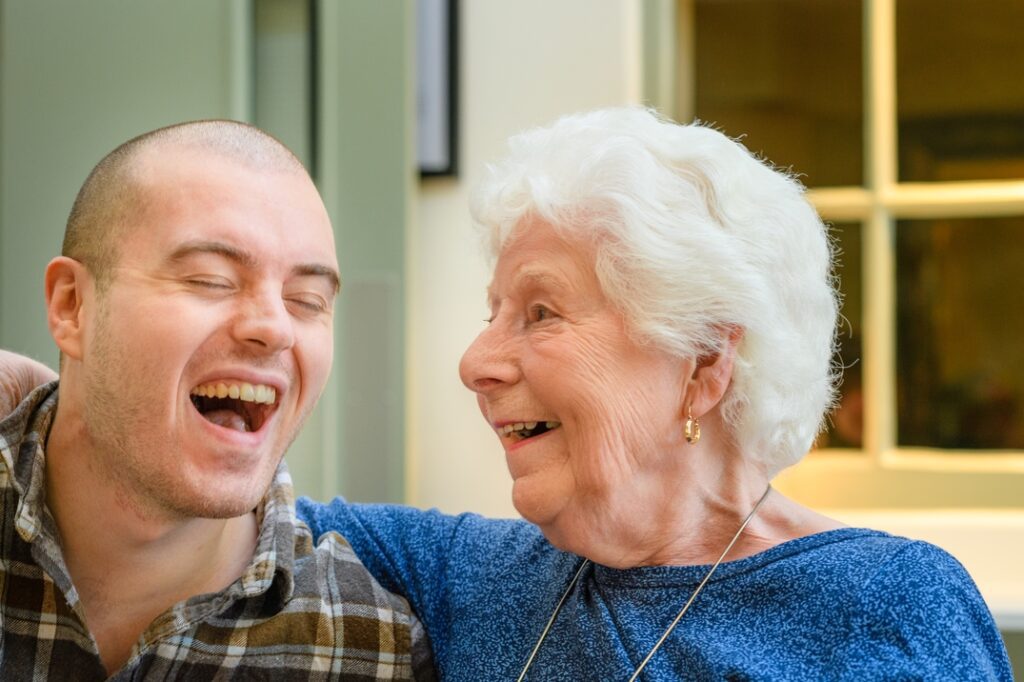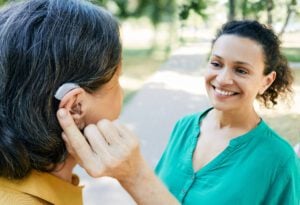Motor neurone care: How do I care for a loved one with motor neurone disease?
Tags
Complex Care
Caring for and supporting a person with motor neurone disease can involve many things. You can help them by first learning as much as possible about MND – then still doing the things they love with them, assisting and accompanying them with daily activities, taking them to doctor appointments, lending a listening ear, being patient, but most of all making life as normal as possible.
What is Motor Neurone Disease?
Motor neurone disease (MND) is a condition that damages parts of the nervous system, resulting in muscle weakness and muscle wasting.
Amyotrophic lateral sclerosis (ALS) is a prevalent type of motor neuron disease (MND).
Motor Neurone Disease occurs when motor neurones, which are specialised nerve cells in the brain and spinal cord, cease to function correctly and experience premature death. This process is referred to as neurodegeneration.
Motor neurons regulate muscle activity.
- gripping
- walking
- speaking
- swallowing
- breathing
As MND progresses, individuals may experience increasing difficulties with performing these activities.
How common is Motor Neurone disease?
Motor neurone disease is relatively uncommon, with usually only 2 in 100 000 people diagnosed yearly. The age of onset is usually 60s and 70s, but it can affect adults of all ages.
MND can be caused by genetic errors, with 20% of cases linked to genetic factors. The genetic error impacts the cells’ ability to function properly and survive.
If a person has a genetic form of MND, it’s possible to pass on the risk of developing MND to their child. Various factors, including age, can influence the child’s likelihood of developing the condition.
Having the genetic mutation doesn’t guarantee that a person will develop MND during their lifetime. Generally, the risk of developing the condition increases with age.
Individuals with a parent who has MND and no other family history of the disease have a slightly increased risk of MND, estimated at around 1.4%. In the general population, the risk of MND is approximately 0.3%.
Having a close relative with motor neurone disease or frontotemporal dementia increases the likelihood of developing the condition.
Symptoms of motor neurone disease
The onset of symptoms of motor neurone disease happens gradually and may not be obvious at first.
Early symptoms:
- Someone may experience weakness in their ankle or leg, potentially leading to difficulties with activities such as climbing stairs or an increased risk of tripping.
- Experience of slurred speech, and in some cases, this may progress to difficulty swallowing certain foods.
- Weak grip – Dropping things or finding it hard to open jars or do up buttons
- Muscle cramps, muscle stiffness and twitches.
- Drastic weight loss
- Difficulty with managing emotions, such as crying or laughing at inappropriate times
Middle stage:
As the condition advances, the initial symptoms become increasingly severe. In addition to the early symptoms, individuals may also experience:
- Muscle shrinkage
- Muscle spasms
- Joint pain
- Difficulty moving
- Uncontrollable yawning, which can lead to jaw pain
- Drooling due to problems with swallowing
- Changes in personality and emotional states
- Cognitive symptoms, such as memory and language problems
- They may develop dementia
- Difficulty breathing
- Experience insomnia, anxiety and depression
End-stage symptoms
As MND progresses to its final stage, people may experience:
- Experiencing increasing body paralysis, requiring assistance with most daily activities.
- Experiencing significant difficulty breathing.
At a certain point, non-invasive breathing support may not be sufficient enough to compensate for impaired lung function. At this stage, additional medication can be beneficial in alleviating symptoms of breathlessness and associated anxiety.
For more information on symptoms, please refer to the NHS website.

How can I support someone with motor neurone disease?
Initially, the person with MND may be able to manage tasks in their day-to-day life as usual, but as time goes on, they may need you to take on a more active role.
With appropriate medical and palliative care, and loving support from friends and family, people living with MND can still have a good quality of life.
Here are some ways you can help improve their quality of life and support them in the best way:
Show empathy and consideration.
One way to support someone with motor neurone disease is by acknowledging their condition and providing them with additional space and consideration, as they may need more time to complete tasks or move around. It’s important to avoid focusing on their difficulties as this can impact their sense of dignity and self-respect.
Keep their mind busy and healthy.
Like any significant health condition, the limitations can significantly impact one’s overall well-being. Finding ways to stay mentally engaged and occupied is important, such as playing board games and solving puzzles when possible or watching television. When the mind is idle, it’s easy to dwell on negative thoughts, and people with motor neurone disease may become more aware of the negative consequences of their situation.
Help them stay active where possible.
Someone with movement difficulties may benefit from finding simple ways to maintain muscle strength, as unused muscles will become even weaker. It’s vital first to understand the severity of their condition and then explore suitable exercise routines that they can manage. This could involve taking a walk; even a short stroll will prove to be beneficial, so try to get out in the fresh air whenever possible or incorporate stretching into their daily routine.
Help avoid fatigue
Muscle weakness and fatigue can make tasks more difficult for someone with MND. The person with the diagnosis of Motor Neurone disease may not want to use assistive equipment (wheelchairs, leg lifts, voice amplifiers) at first in order to feel like they still have independence – however, the assistance equipment will help with saving energy.
If the person with MND tires easily, you can assist them by helping them plan, pace and prioritise tasks, such as what can be done less or what can be done tomorrow or not at all. Advise them to sit during tasks where possible and take rests when there’s no need to rush.
Some MND patients find that massage helps to keep muscles in top condition, while others choose acupressure and even Reiki. Explore the options available and keep an eye out for gentle, seated exercise classes, too, such as Tai Chi for seniors, which helps create a sense of well-being.
Engage with others
Meeting and getting to others living with MND can offer solace and assistance for those impacted and their loved ones. Annually in June, there is a dedicated MND awareness month, focusing on enhancing treatment, finding a cure for this debilitating condition and sharing people’s stories. MND awareness month can show people they’re not alone, and there are people they can talk to and empower them to talk about living with MND themselves.
Live-in care
Having a live-in carer can help your loved one to live more comfortably in their own home by assisting them with the challenges presented by MND symptoms. This one-to-one, live-in care will provide not only physical support but also emotional support and companionship, which is pivotal to mental well-being.
As the condition progresses, more care may be required – this is where 24-hour live-in care may become necessary. With 24-hour care, more than one carer is on hand, and your loved one will receive 24-hour professional care and support.
This type of home care means you can rest assured that your loved one is in good hands with a reliable, professional carer, specially selected and matched to their MND needs.
Cooking and meal times
Over time, Motor Neurone Disease affects the throat, making it difficult to swallow and speak.
Your loved one may need their food blended so they don’t have to try to chew it. Take the time to include flavours that you know they love. It may also be helpful to make mealtimes slow and provide several smaller meals throughout the day rather than three larger meals.
You can help the person you care for with MND by finding easy-swallow recipes and other meal tips that can make eating easier and enjoyable again. The MND have an Eating and Drinking guide filled with a wide range of information, advice and easy-swallow recipes – the recipes come from people personally affected by MND, including professionals and celebrity chefs.

What activities can you do with someone with MND?
What activities and hobbies a person with MND can do depends on their symptoms, what areas of their body is affected and what stage their diagnosis is at – therefore what you can do with the person you care for depends on their personal experience with MND.
Many people can still pursue their favourite activities and hobbies – for example, if someone enjoys hiking with friends, and only their speech is affected by MND, then this is still something they can pursue. Or someone with limited leg movement can still sing in their weekly choir.
If you know someone with MND in more advanced stages and needs assistance in most activities, here’s a list of advice and equipment available to assist them in enjoying activities they may have liked before the onset of the illness:
Reading
- To prevent books from slipping, an adjustable table or bookstand and a non-slip mat can be used.
- An e-book reader is a portable electronic device designed specifically for reading books without needing a physical version of each book. It makes it easier to turn each page with a click or a tap.
- You can use a stationer’s rubber thimble or a short wooden rod to make page turning easier. Alternatively, for e-book readers and tablets, a stylus can be used.
- To make page turning easier, attach steel paper clips to each page and use a small magnet attached to the end of a short stick.
- Different switches can operate electric page-turners, but it should be noted that they are bulky and can be temperamental. Additionally, not all models are compatible with newspapers.
- Certain smartphones are equipped with a text viewer, allowing them to function as e-book readers.
- Audiobooks can be bought from websites such as audiobooks.co.uk or accessed from a local library. They provide easy access to books of all genres and titles without holding or owning physical books.
Writing
- Different materials like elastic bands, pimple rubber or foam, special pen grips, or high-density foam tubing can be used to build up a pen or pencil, making them easier to grip.
- To prevent the paper from slipping, use a non-slip mat.
- Use felt-tip pens and markers to allow less pressure and are easier to hold.
Computers
Computers require a light touch and can provide arm support. They can also serve as communication aids for individuals with speech impairments. Additionally, computer games and social media platforms offer opportunities for easier accessible social connection.
Depending on the access needs required, you can get several different adaptions for computers and laptops. Several different types of mice can be used, such as adjustable ergonomic mouse, which allows for different wrist positions, head controlled mouse, which uses a head movement sensor to control the computer. Many computers also have built in voice recognition that can be set up to control devices, but you can also pay for specialist software.
Sewing and craftwork
- It’s recommended to use long dressmaking pins with large heads.
- Use a suction cup to secure your pincushion.
- Needle threaders can be used for both hand and machine needles.
- Consider using electric or lightweight scissors.
- Attach embroidery frames to a table using clamps.
Cards and board games
- Use a cardholder
- Use an automatic card shuffler.
- Use large cards
- Playing games with large pieces, such as chess, draughts and dominoes, to make the grip easier
Visiting Parks
If a person with an MND diagnosis has always enjoyed visiting parks, The National Trust website has an access guide, so you can plan days out to parks and gardens that will be inclusive, including step-free access, level paths, and even knowing the distance from a car park to a walking route, cafes or benches.
The website AccessAble provides extensive information and guides to know if a place in the UK is accessible, such as parks, shops, restaurants and many more.

Help to prepare for the future.
No two people experience the same symptoms with MND, so care plans must be individually tailored, taking into account the needs and wishes of your loved one.
People with Motor Neurone Disease should be encouraged to discuss their care options and preferences for end-of-life care before it becomes urgent or they cannot communicate their wishes.
Over time, someone with MND should meet with a range of healthcare professionals to have an action of care plan to ensure that they’re prepared and everyone involved in their care understands what is required of them. Having time to think things through and knowing that wishes have been recorded in an advance care plan gives many people peace of mind.
Bear in mind that the ongoing degenerative effects of the disease mean a regular review of their care is necessary. As your loved one experiences further symptoms, their needs will gradually increase, which should always be reflected in their care plan.
Learn more about complex care
Take a look at more Elder guides on how to support those living with complex conditions below.

Can I arrange nursing care at home?
Nursing care is provides care and treatment to people with complex medical conditions, but is it possible to receive it at home? We take

Living well with diabetes in later life
It’s estimated that over a third of people with diabetes in the UK are over 65 years of age. That’s around 1.5 million people.

Caring for different types of hearing loss
According to Age UK, hearing loss affects around 12 million adults in the UK. People with hearing loss may not always require specialist care

Vision loss in older people – Is there a cure, and how can it be cared for?
Vision Loss Care: Is There a Cure? Your loved one may develop signs of vision loss as they grow older. However, there are ways

Motor neurone care: How do I care for a loved one with motor neurone disease?
Motor Neurone care: How do I care for a loved one with Motor Neurone Disease? A diagnosis of Motor Neurone Disease, commonly referred to

Arthritis in the elderly – causes and care options
Arthritis Care: What Causes Arthritis in the Elderly? Arthritis, which causes painful and inflamed joints, can affect anyone at any age. However, we
